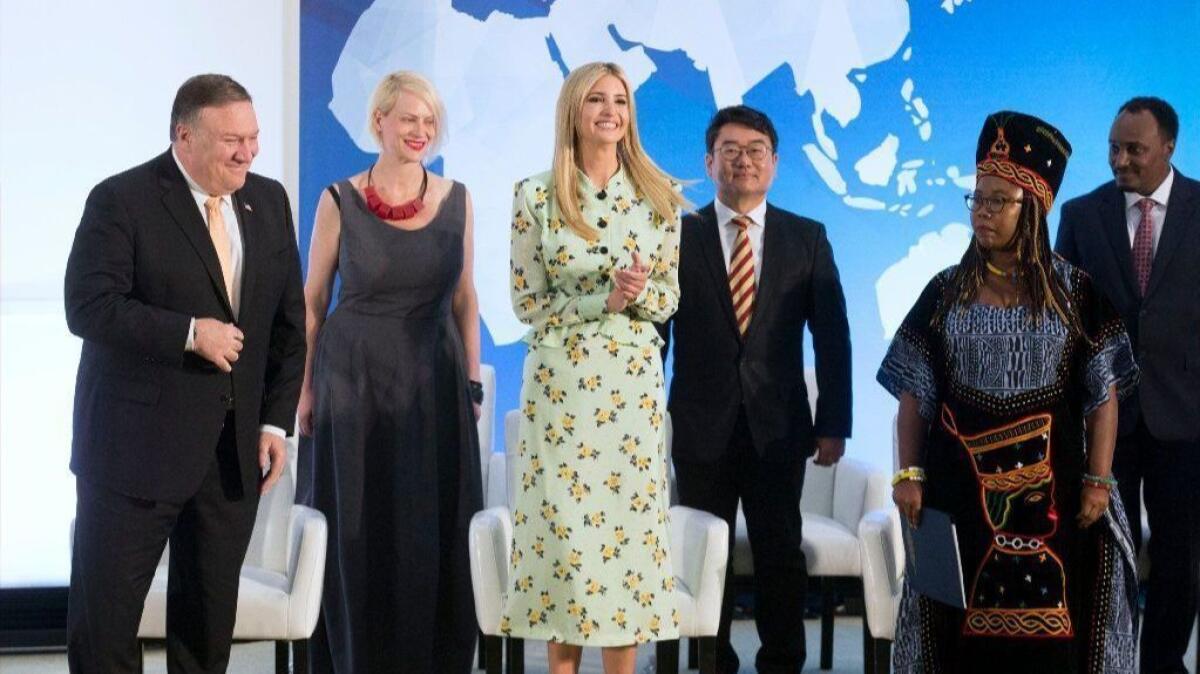Ivanka Trump helps unveil administration report that decries the effect of separating children from parents

- Share via
Reporting from Washington — The practice of separating children from their parents and detaining them received scathing criticism Thursday from an unlikely source: the Trump administration.
A new 68-page report on international human trafficking, unveiled by Secretary of State Michael R. Pompeo during a ceremony with Ivanka Trump at the State Department, devotes two pages to withering condemnation of separating families. The harmful “physical and psychological effects of staying in residential institutions,” it said, put children at additional risk of human trafficking.
“The international community agrees that a family caregiving setting, or an alternative solution that is appropriate and culturally sensitive, is the most conducive environment for the growth, well-being, and safety of children,” the report states.
It added: “Removal of a child from the family should only be considered as a temporary, last resort.”
Though the report was prepared before the administration began its family separation policy in May, its findings were certain to be viewed as an indictment of Trump’s “zero tolerance” policy on illegal border crossing.
As a result of that directive, migrant children were taken from their parents when families illegally crossed the southern border from Mexico. Some administration officials had called the separations a deterrent to illegal immigration before Trump — amid an international outcry — last week temporarily suspended the policy.
More than 2,000 children remain in custody separate from their parents, and a federal court has ordered the government to quickly reunite the families. However, Health and Human Services Secretary Alex Azar said this week that many will remain detained while their parents await asylum hearings that could take months or years to resolve.
Follow the latest news of the Trump administration on Essential Washington »
The State Department report cites studies finding “both private and government-run residential institutions for children” cannot “replicate the emotional companionship and attention found in family environments that are prerequisites to healthy cognitive development.”
“Even at their best, residential institutions are unable to meet a child’s need for emotional support that is typically received from family members or consistent caretakers with whom the child can develop an attachment,” the report continues.
Human rights activists, who have joined in the chorus of criticism of Trump’s policy, could hardly believe what they were reading.
“The State Department deserves credit for its comprehensive exposition on the horrors of institutionalizing children, detailing how removing children from family caregiving settings causes long-term emotional harm and mental health effects, and heightens risks of human trafficking,” said John Sifton, an advocacy director for the group Human Rights Watch.
“We hope Ms. Trump and Secretary Pompeo can share it with other federal agencies and brief them about it in more detail,” he added.
A senior State Department official, who demanded anonymity in a background call with reporters, said that children being detained in U.S. facilities are screened to protect them from human trafficking. But the official directed specific questions about the well-being of children “to our colleagues in the Department of Health and Human Services that oversee the care of children in their care — in institutions.”
An HHS spokesman asked for a copy of the report and did not immediately have a response.
Times staff writer Tracy Wilkinson contributed to this report.
noah.bierman@latimes.com | Twitter: @noahbierman
More to Read
Get the L.A. Times Politics newsletter
Deeply reported insights into legislation, politics and policy from Sacramento, Washington and beyond. In your inbox twice per week.
You may occasionally receive promotional content from the Los Angeles Times.











